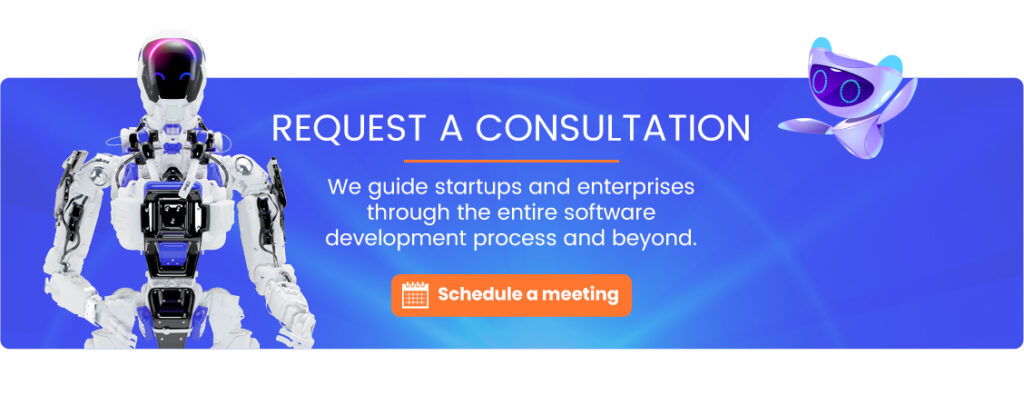Artificial intelligence is changing business – although not as fast as many assume. As organizations navigate the digital landscape, the integration of artificial intelligence has emerged as a transformative force, reshaping industries and revolutionizing traditional business models.
We will explore the profound impact of AI and provide a comprehensive guide for businesses embarking on the path of AI adoption. From understanding the fundamental principles of AI to data driven decision making strategies across various business functions, this article serves as a roadmap to help organizations harness the true potential of AI.
Join us on this transformative journey as we unravel the key insights, challenges, and opportunities that come with building an AI-powered organization. Embrace the possibilities that AI offers for a successful future in the era of business transformation.
How to Build an AI Business?

Building an AI business requires a strategic and holistic approach that encompasses various key aspects. Firstly, it is crucial to have a clear vision and understanding of how AI can add value to your business and address specific challenges or opportunities. This involves identifying the areas within your organization where AI can make a significant impact and drive meaningful outcomes. Secondly, assembling the right talent and expertise is essential.
Building a team of data scientists, AI specialists data engineers, and domain experts who possess the necessary skills and knowledge is paramount for success. Collaborating with partners and leveraging external resources can also provide additional support. Thirdly, data is the lifeblood of AI, and having a robust data strategy is vital. Ensuring data quality, accessibility, and security, as well as establishing data governance practices, enables effective AI-driven insights and decision-making.
Additionally, investing in AI solution development platforms, tools, and technologies that align with your business goals is crucial. Implementing scalable and adaptable AI systems and platforms can streamline processes and facilitate AI adoption. Lastly, it is essential to foster a culture of innovation and continuous learning within the organization.
3 Steps to Build an Organization Based on Artificial Intelligence

Define the AI Vision and Strategy
Building an organization based on artificial intelligence (AI) starts with defining a clear vision and strategy. It involves understanding how AI can align with your business objectives and create value. Begin by identifying specific use cases where AI can have the greatest impact, such as optimizing processes, enhancing customer experiences, or driving innovation.
Develop a roadmap that outlines the goals, milestones, and resources required to implement AI effectively. This step sets the foundation for building an AI-driven organization and an organizational structure that ensures alignment between AI initiatives and business objectives.
Establish the Right Infrastructure and Data Capabilities
To leverage the power of AI and advanced analytics, organizations need to establish the right infrastructure and data capabilities. This involves building a robust data ecosystem that enables efficient data collection, storage, and processing. Invest in scalable and secure cloud-based platforms that facilitate data management and advanced analytics.
Additionally, organizations efforts ensure data quality and integrity by implementing data governance practices and leveraging data cleaning and preprocessing techniques. Establishing a strong data foundation and infrastructure empowers organizations to harness the full potential of AI by using advanced data analytics together, enabling accurate analysis, modeling, and decision-making.
Cultivate an AI-Driven Culture and Skill Set
Building an organization based on AI requires cultivating an AI-driven culture and fostering the necessary skill set. Encourage a mindset of continuous learning and innovation among employees. Promote awareness and understanding of AI technologies and their applications through training programs, workshops, and knowledge-sharing initiatives.
Attract and retain top talent with expertise in AI, data science, and machine learning by offering competitive compensation packages and career growth opportunities. Encourage cross-functional collaboration to promote the integration of AI across departments and business functions.
By creating an environment that embraces AI, organizations can effectively capture AI’s opportunities.
Opacity and Lack of Explainability

Opacity and lack of explainability are significant challenges when it comes to building an AI business. While AI algorithms can deliver impressive results, they often operate as black boxes, making it difficult to understand the underlying decision-making process and operating model. This lack of transparency raises concerns about the reliability, fairness, and ethics of AI systems.
Businesses need to address these challenges by focusing on building explainable AI models. This involves adopting techniques such as interpretable machine learning and leveraging approaches that provide insights into how each AI model arrive at it’s conclusions.
By prioritizing transparency and explainability, organizations can build trust with customers, regulators, and stakeholders. Furthermore, it enables businesses to identify and mitigate biases, ensure compliance with regulations, and improve the overall acceptance and adoption of AI solutions. Transparency and explainability are vital for building responsible and ethical AI businesses that can navigate the complexities and challenges of the AI landscape.
Complexity and Unpredictability

Complexity and unpredictability are inherent challenges when it comes to building an AI business. Developing and implementing AI solutions involve intricate processes that require specialized knowledge and expertise. The complexity arises from the intricate interplay between various algorithms, data sources new tools, and models.
Additionally, the field of AI is constantly evolving, advancing rapidly, with new techniques, frameworks, and tools emerging regularly, making it challenging to keep up with the rapid pace of innovation. Moreover, AI systems can exhibit unpredictable behaviors, especially when operating in dynamic and uncertain environments. The lack of certainty and predictability can hinder decision-making processes and pose risks to business operations.
To navigate these challenges, organizations must invest in robust research and development efforts, collaborate with experts in the field, and stay up-to-date with the latest advancements.
Developing a deep understanding of the strengths and limitations of AI technologies is crucial for building reliable and effective AI projects. Additionally, data experts should implement rigorous testing and validation processes to assess the performance and reliability of their AI systems.
Vulnerability to Adversarial Attacks

Vulnerability to adversarial attacks is a critical concern when building an AI business. Adversarial attacks refer to deliberate attempts to manipulate or deceive AI systems by introducing malicious inputs or perturbations. These attacks exploit vulnerabilities in AI algorithms, which can result in significant consequences such as incorrect predictions, compromised security, or misleading outputs. Adversarial attacks pose a threat to the reliability, integrity, and trustworthiness of AI tools, particularly in applications like cybersecurity, fraud detection, or autonomous vehicles.
To mitigate this risk, organizations must prioritize robustness and security in their AI solutions. This involves implementing robust defense mechanisms, such core practices such as adversarial training, input sanitization techniques, and anomaly detection algorithms.
Additionally, continuous monitoring and rigorous testing of AI systems can help identify vulnerabilities and reinforce system resilience. By addressing the vulnerability to adversarial attacks, businesses can bolster the trust and reliability of their AI solutions, ensuring they are robust, secure, and resilient in the face of potential threats.
Data Privacy and Security Concerns
Data privacy and security concerns are paramount when it comes to building an AI education or AI business. The success of AI applications heavily relies on access to vast amounts of data, often including sensitive and personal information.
As adopting AI to result, businesses must prioritize safeguarding this data to protect individuals’ privacy and comply with relevant regulations such as GDPR or CCPA. Building an AI business requires implementing robust data privacy measures, including secure data storage, data encryption, access controls, and anonymization techniques.
Additionally, organizations must establish strict data governance policies and procedures to ensure the responsible and ethical use of data throughout the AI development lifecycle. Addressing data privacy and security concerns fosters trust among customers, stakeholders, and regulatory bodies, which is crucial for the long-term success and sustainability of an company’s AI business.
By proactively addressing data privacy and security challenges, businesses can demonstrate their commitment to protecting individuals information, mitigate the risk of data breaches, and uphold the highest standards of data protection in the AI landscape.
Changes That are Taking Place in Companies That are Starting to Use Artificial Intelligence

Changes taking place in companies that are starting to use artificial intelligence are often more complex than they may appear at first glance. While the adoption of AI holds tremendous potential for organizations, it requires a significant shift in mindset, processes, and infrastructure. Incorporating AI technologies involves reimagining business models, redefining workflows, and integrating new systems and tools.
It demands a deep understanding of the capabilities and limitations of AI, as well as the ability to align AI strategies with business objectives. Furthermore, deploying AI requires substantial investments in talent acquisition, training, and infrastructure. It entails building data pipelines, implementing scalable computing resources, and ensuring data quality and availability. Moreover, AI implementation necessitates comprehensive change management to address employee concerns, promote adoption, and foster a culture of continuous learning.
Organizations embarking on the AI journey must be prepared to navigate these complexities, invest in the necessary resources, and approach the transformation with a thoughtful and strategic mindset. By recognizing the multifaceted nature of AI adoption, businesses can navigate the challenges more effectively and unlock the transformative potential of AI to drive innovation, efficiency, and competitive advantage.
Challenges and Implementation Strategies

Implementing artificial intelligence in business brings its fair share of challenges, along with the potential for transformative business outcomes. One significant challenge is the complexity of AI technologies and the need for specialized expertise.
Developing AI models, training data sets, and fine-tuning algorithms require skilled data scientists and AI specialists. Additionally, organizations must navigate the ethical considerations surrounding AI, such as ensuring fairness, transparency, and avoiding biases. Another hurdle is the integration of AI systems with existing infrastructure and processes. This requires careful planning, data integration, and collaboration across departments to leverage the full potential of AI.
Furthermore, there can be resistance to change among employees, who may fear job displacement or lack the necessary skills to work alongside AI technologies. Effective implementation strategies involve investing in talent development, fostering a culture of innovation and continuous learning, without organizational barriers, and ensuring clear communication about the benefits of AI.
It is crucial for organizations to establish a strong governance framework for AI, addressing issues of data privacy, security, and compliance building the AI used.
Four Features of AI That Make Trust Difficult

Four features of artificial intelligence present challenges to establishing trust in its capabilities.
- AI operates on vast amounts of data, which can make it difficult to understand the underlying decision-making process. The opacity of AI systems means that it may be challenging to trace how conclusions are reached, leading to a lack of transparency.
- AI algorithms are constantly evolving and learning from new data, making their behavior unpredictable. This unpredictability makes it challenging to anticipate how an AI system will perform in different scenarios, raising concerns about its reliability.
- AI models can be vulnerable to adversarial attacks, where malicious actors exploit vulnerabilities in the system to manipulate or deceive it. These attacks can undermine the trustworthiness of AI and compromise its integrity.
- The inherent bias in data used to train AI systems can result in biased outcomes, perpetuating societal inequalities. Addressing these challenges requires efforts to enhance transparency, interpretability, and fairness in AI algorithms. Establishing clear guidelines for system behavior, robust security measures, and comprehensive data governance practices can help build trust in AI and ensure its responsible and ethical use.
The Future of AI in Business

The future of artificial intelligence in business holds immense promise and potential. As AI continues to advance in a blistering pace, it is expected to revolutionize various aspects of business operations. One significant area of transformation is enhanced automation, where AI-powered systems can perform repetitive tasks, freeing up human resources for more strategic and creative endeavors.
Additionally, AI can enable better decision-making by processing vast amounts of data and extracting valuable insights, leading to improved efficiency and productivity.
How Artificial Intelligence Will Change Business
Artificial intelligence is poised to bring about transformative changes in the business landscape. With its ability to process massive amounts of data, extract meaningful insights, and make intelligent decisions, AI is revolutionizing various aspects of business operations.
One significant change is the automation of repetitive and mundane tasks, freeing up human resources to focus on more strategic and value-added activities. AI-powered technologies can also enhance customer experiences by providing personalized recommendations, virtual assistants, and real-time support.
Moreover, AI enables most firms to gain a competitive edge through advanced analytics, predictive modeling, and optimized decision-making. It has the potential to revolutionize industries such as healthcare, finance, manufacturing, and marketing by improving efficiency, reducing costs, and business problems leading to a totally automated customer service.
Innovating and Creating New Opportunities
Innovation and creating new opportunities are at the core of driving business growth and success. With the advent of artificial intelligence , businesses have an unprecedented opportunity to harness its power and unlock a realm of possibilities.
AI enables organizations to analyze vast amounts of data, uncover hidden patterns, and gain valuable insights that can drive innovation and inform strategic decision-making. By leveraging AI technologies, businesses can identify emerging market trends, understand customer preferences, and develop tailored products and services to meet evolving demands.
Furthermore, AI empowers businesses to automate processes, optimize operations, and enhance productivity, allowing them to focus on higher-value tasks and creative problem-solving. Through AI-powered new ideas, businesses can explore new models, improve customer experiences, and stay ahead of the competition.
Summary
In today’s ever-evolving business complexity, building an AI-powered organization has become a vital step towards business transformation and achieving a competitive edge. The process of harnessing the power of artificial intelligence requires careful planning and strategic considerations. It involves understanding the significance of data, acquiring the right talent, and cultivating a culture that embraces innovation.
Challenges such as opacity, complexity, vulnerability to adversarial attacks, and data privacy concerns must be addressed to establish trust and ensure the success of AI implementations. Organizations that embrace AI witness significant changes in their operations, fostering adaptability and a growth mindset. Looking ahead, the future of AI in business holds immense potential to reshape industries, drive innovation, and unlock new opportunities.
By following a comprehensive guide to building the company’s AI maturity, businesses can navigate this transformative journey and position themselves for long-term success in the digital era.







